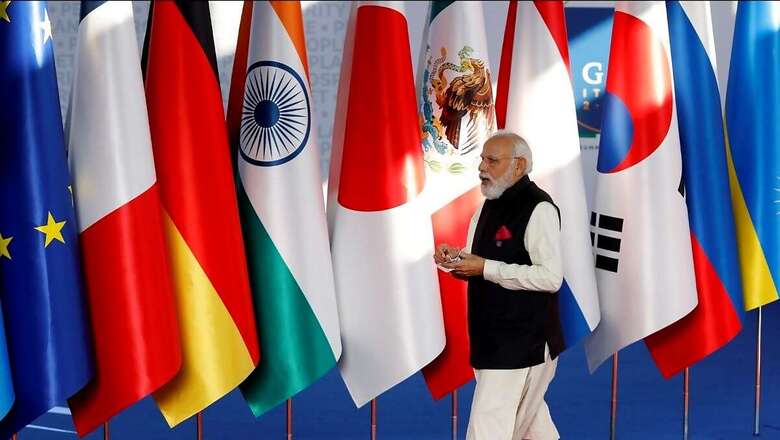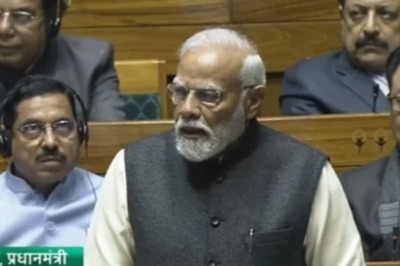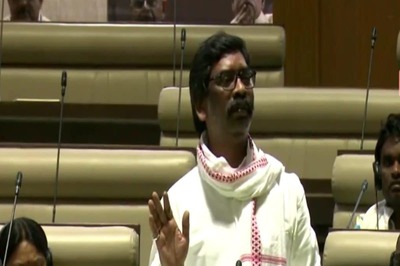
views
A flurry of G20 summits will be held under India’s presidency this summer. Leaders from the United States say they want India’s G20 presidency to be a success. What they don’t say is that the success will be judged on US terms. What are those terms? Most crucially, India should get off the fence on the Russia-Ukraine war. G20 summit communiqués must include a condemnation — however diplomatically framed — of Russia’s invasion.
For the US-led West, the 20th century was a period of conflict: two world wars, wars in Vietnam and Korea, wars in Iraq, Syria and Yemen, wars in Latin America, wars in Africa, and wars in the former Yugoslavia.
Just when the West was getting used to a relatively war-free world after exiting a 20-year conflict in Afghanistan, Russia brought war back to the heart of Europe.
In the award-winning film Munich: The Edge of War, British Prime Minister Neville Chamberlain is shown appeasing Hitler to avoid war between Germany and Britain, Europe’s leading powers. Hitler disarms Chamberlain, assuring him that Germany has no territorial ambitions in Europe except the Sudetenland area in Czechoslovakia which had a majority German population. To buy peace, Chamberlain flew to Munich for a summit meeting on September 29-30, 1938 between Hitler and the leaders of France and Italy. Russia was not invited. Nor was Czechoslovakia. One day later, on October 1, 1938, the German army invaded Czechoslovakia and occupied the Sudetenland. As Britain and France continued to appease Hitler, Germany became more aggressive, demanding the annexation of Gdansk in Poland.
Meanwhile, Germany signed a non-aggression pact with the Soviet Union on August 23, 1939, days before the German army invaded Poland. Britain and France were finally forced to declare war on Germany on September 3, 1939.
Has the West learned the lessons of two devastating world wars in the 20th century? One, do not appease an aggressor. Two, do not humiliate your defeated enemy.
Hitler’s rise in the 1930s was due to the deep sense of humiliation Germans felt at the end of the First World War in 1918. The Treaty of Versailles forced Germany not only to surrender territory but pay war damages to the victorious allies — the US, Britain and France. The West, especially Britain and France, built lucrative overseas empires through invasive colonial wars. The US took over the mantle after 1945, not through colonisation but by creating instruments that would allow American domination of global affairs: the United Nations Security Council, the World Bank and the International Monetary Fund. These gave the US-led West instruments to control both international security and finance.
Russia’s invasion of Ukraine has upset the West’s decades-old calculations. Just as the allies had humiliated a defeated Germany in 1918 at the end of the First World War, the US-led West began the humiliation of Russia at — ironically — the Munich Security Conference in 2007 by insisting on placing NATO at Russia’s doorstep. Until then, Russia had sought closer ties with Western Europe and had been invited to join the powerful G7 which was expanded in 1997 into the G8 to accommodate Russia.
NATO meanwhile continued to expand eastwards, absorbing former satellite states of the Soviet Union. Russia reacted by annexing Crimea in 2014. Furious, the West expelled Russia from the G8, reverting the group to the G7. The invasion of eastern Ukraine began soon after with skirmishes in the Russian-speaking Donbas before Russia’s full-scale invasion of Ukraine on February 24, 2022.
Is history repeating itself? Is Russia making the same mistake Germany made in Czechoslovakia and Poland over 80 years ago? And is the US-led West falling into the hubristic trap it laid for itself in 1919, attempting to humiliate Russia — as it did Germany — by crippling its economy with sanctions and isolating it internationally?
The circumstances obviously are different. Russia’s invasion of Ukraine’s sovereign territory is as wrong as Germany’s eastwards expansion into Czechoslovakia and Poland was a century ago.
Where does India fit into the splintered geopolitical architecture pitting the US-led alliance against the Russia-China axis?
The G20 presidency affords India an opportunity to lead half the world that is not committed to either of the two axes. This includes 55 nations in Africa (total population: 1.2 billion), 12 sovereign countries in South America (450 million) and a smattering of smaller nations. Along with India’s population (1.4 billion), the neutral nations thus comprise 3.2 billion people or 40 per cent of the world’s 8-billion population.
The Global South, as this grouping is dubbed, annoys the US-led West. It seeks the total allegiance of “neutral” nations. It knows India, soon to be the world’s third-largest economy, can tilt the balance. But the West faces a dilemma. It wants a strong India, but an India not so strong that it is not subordinate to Western-dictated world order.
India otherwise ticks all the boxes: it is a vibrant democracy and has an independent judiciary, a large consumer market, innovative technology and a resourceful military. It is the only democracy that has risen through the ranks of great powers without invading another country (as most of the G7 have done on their path to “greatness”). It is, like China, an ancient civilisation but unlike ageing, communist China it is a young democracy.
The West yearns for India to be part of the US-led world order, not a separate power centre as a leader of the Global South.
The spate of G20 summits this year, culminating with the heads of government summit in Delhi in September 2023 with US President Joe Biden, Chinese President Xi Jinping and Russian President Vladimir Putin likely to attend, must however deliver a clear message of a strong, but not subordinate, India in the new world order.
The writer is an editor, author and publisher. Views expressed are personal.
Read all the Latest Opinions here
















Comments
0 comment